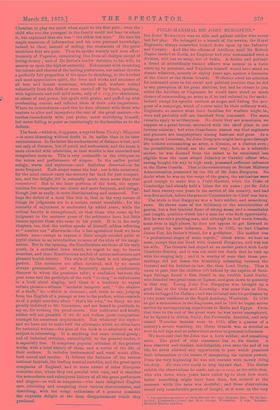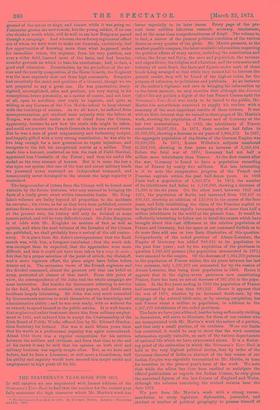FIELD-MARSHAL SIR JOHN BURGOYNE.*
SIR JOHN BURGOYNE was an able and gallant soldier who never had fair play. He belonged to a branch of the service, the Royal Engineers, always somewhat looked down upon by the Infantry and Cavalry. And like the officers of Artillery, until Sir Robert Napier landed at Zonla, no Engineer had ever commanded even a division, still less an army, out of India. A dislike and perhaps a dread of scientifically trained officers was natural in a force eaten up by purchase, and Napoleon himself would have stood no• chance whatever, seventy or eighty years ago, against a favourite of the Court or the Horse Guards. Wellesley owed his selection for command more to his social and political position than he did to any perception of his great abilities, but had he chosen to join either the Artillery or Engineers, he would have stood as much chance of commanding an army as if he had enlisted iu the ranks.. Indeed, except for specific services at sieges and during the pro- gress of a campaign, which of course must be their ordinary work, Engineers, no matter what their faculties for warfare might be, were and probably still are banished from command. The same remarks apply to artillerymen. No doubt they are sometimes, we suppose as a great favour, entrusted with the chief place in oar fortress colonies ; but even Guardsmen cannot say that engineers and gunners are inappropriate among bastions and guns. As a Dragoon or Linesman, Sir John Burgoyne might have gone through life without commanding an army, a division, or a district even ; the probabilities, indeed, are the other way ; but, as a scientific soldier, he was doomed from the outset to be considered less- eligible than the most stupid Infantry or Cavalry officer who, having bought his way to high rank, possessed sufficient influence at the Horse Guards. That is the commentary on British Military Administration presented by the life of Sir John Burgoyne. No doubt when he was on the verge of the grave, the authorities were good enough to make him a Field-Marshal, when the Duke of Cambridge had already held a baton for six years ; yet Sir John had been twenty-one years in the service of his country, and had won five medals, before the present Commander-in-Chief was born..
The truth is that Burgoyne was a born soldier, and something more. He shows none of the brilliancy or the eccentricities of genius, but a fine lambent flame of strong sense, and a remarkably just insight, qualities which lead a man far who finds opportunity. But he was not a pushing man, and although he had warm friends, some even in high places, he does not appear to get forward at any period by mere influence. Born in 1782, he had Charles James Fox, his father's friend, for a godfather. His mother was "a professional Binger of some repute," about whom we hear not more, except that she lived with General Burgoyne, and was not his wife. The General had eloped at an earlier period with Lady Charlotte Stanley, and it was not until her death that he took up- with the singing lady ; and it is worthy of note that these pro- ceedings did not lessen the friendship subsisting between the General and his brother-in-law, the then Lord Derby. Thus it. came to pass that the children left behind by the captive of Sara- toga Springs found a firm friend in the twelfth Lord Derby, who founded two great races at Epsom, and goes down to posterity is that way. Young John Fox Burgoyne was brought up a good deal at the Oaks and Knowsley; was some time at Eton, where he fagged for Hallam ; and was initiated into his profession by a two years' residence at the Royal Academy, Woolwich. In 1798 he got a commission in the Engineers, and in 1800 he began active service by accompanying expeditions to Malta and Egypt. From that time to the end of the great wars he was never unemployed, for he figured in Africa, Sicily, the Peninsula, America, and only missed Waterloo because even in 1815, after a quarter of a century's severe teaching, the Horse Guards was as devoted as ever to red tape and as subservient as ever to personal influences.
We have said that Sir John was a born soldier, and something more. The proof of that statement lies in his diaries. A. keen observer and student indefatigable, even unto the end of his. life, he never allowed any opportunity to pass which promised fresh information or the means of sharpening his natural powers. From the very beginning he was not content with merely doing his duty. He was ever ready to step beyond that. The diaries exhibit the observations he made, not apres coup, as the critic does, who sits down when years have rolled by to show how much better something might have been done, but entered at the moment while the issue was doubtful ; and those observations reveal very considerable powers of insight, as it were on the very
• Life and Correspondence of Field-Marshal Sir John Burgoyne, Bart. By his Son- in-Law, Llentennnt-Colonei the Ron. George Wrottesley. 2 volts London: Richard Bentley and Son. ground of the action or siege, and almost while it was going on. Peninsular glories are now remote, but the young soldier, if no one -else thinks it worth while, will do well to see hoiv Burgoyne passed -through a campaign. And whereas the ordinary regimental officer -out of whom we were wont to make our Generals, exclusively, had few opportunities of knowing more than what happened under his immediate vision, the engineer, from his very position, saw over a wider field, learned more of the facts, and had broader, sounder grounds on which to base his conclusions ; had, in fact, a good staff education. Nevertheless, by the prejudices of the ser- vice and the courtly composition of the Horse Guards, the Engineer was the man expressly shut out from high commands. Burgoyne had essentially the mind and qualities of a General, though we are not prepared to say a great one. He was penetrative, sharp- -sighted, accomplished, calm and prudent, yet very daring in his conceptions, brave personally, as a matter of course, and not least of all, open to novelties, ever ready to improve, and quite as willing as any German of the Von Moltke school to keep abreast with the teachings of science. As we all know, he suffered from misrepresentation, got credited most unjustly with the failure at Burgos, was recalled under a sort of cloud from the Crimea, apparently, because he saw how the south side might be taken, and could not convert the French Generals to his own Bound views. But he was a man of great magnanimity and forbearing temper, and happily gifted with a very strong constitution ; he was able to Eve long enough for a new generation to repair injustices, and recognise to the full his exceptional merits as a soldier. They made him a baronet, conferred on him the rank of Field-Marshal, appointed him Constable of the Tower ; and thus his useful life ended on the very summit of honour. But it is none the less a Blur upon our system that one of the best and surest military heads we possessed never exercised an independent command, and consequently never developed to the utmost the large capacity it contained.
The large number of letters from the Crimea will be found most valuable by the future historian who may succeed in bringing the facts of a really great event within reasonable limits. Mr. King- lake's volumes are bulky beyond all proportion to the incidents 'he narrates ; his views, as far as they have been published, contain serious flaws in statement as well as in opinion ; and if he continues at the present rate, his history will only be finished at some remote period, and will be very difficult to read. Sir John Burgoyne is at odds with Mr. Kinglake on matters of fact as well as opinion, and when the next volumes of the Invasion of the Crimea are published, we shall probably have a revival of the old contro- versy. It is plain from Sir John's correspondence that the flank march was, with him, a foregone conclusion ; that the south side was stronger than he expected, that the approaches were more difficult, and that it could not have been taken by a coup de main ; but that by a proper selection of the point of attack, the Malakoff, and a more vigorous effort, the place might have fallen before winter set in. The erroneous views of the French engineers and ,the divided command, almost the greatest evil that can befall an army, prevented all chance of that result. From this point of view, the correspondence of Sir John and the whole campaign are most instructive. But besides the documents referring to service in the field, both volumes contain many papers, and detail some incidents largely interesting. Sir John was very much consulted by Governments anxious to avail themselves of his knowledge and administrative ability ; and he was ever ready, with or without fee or reward, to spend himself in the public service. It is well known that neglect and unfair treatment drove him from military employ- ment in 1831, and induced him to accept the Chairmanship of the Irish Board of Public Works, offered him by Mr. Edward Stanley, then Secretary for Ireland. Nor was it until fifteen years later that his worth in a professional capacity was again remembered. About 1846 there was a regular competition for his services between the soldiers and civilians, and from that time to the end of his career it may be said that his opinion on both civil and military business was eagerly sought after. But, as we have said before, had he been a Linesman, or still more a Guardsman, half his ability and sagacity would have secured him ample credit and .employment in high posts all his life.



































 Previous page
Previous page